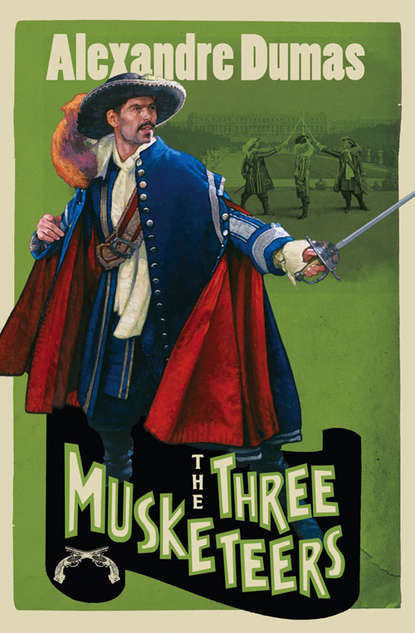По всем вопросам обращайтесь на: info@litportal.ru
(©) 2003-2024.
✖
The Three Musketeers
Автор
Год написания книги
2018
Настройки чтения
Размер шрифта
Высота строк
Поля
D’Artagnan, who was naturally very curious, as men of talent generally are, made every effort to find out who Athos, Porthos, and Aramis really were; for, under one of those assumed appellations, each of these young men concealed his real name.
It was evident they were of good origin, too, particularly Athos, who might be known as a nobleman at a league’s distance. He therefore tried from Porthos to get some information concerning Athos and Aramis; and assailed Aramis, to find out something concerning Porthos.
Unfortunately, Porthos knew no more of the life of his silent comrade than that which has been told. It was said that he had met with great misfortunes of the heart, and that a terrible treachery had for ever poisoned the happiness of this gallant man. What this treachery was, no one knew.
As for Porthos, except his real name, with which M. de Treville alone was acquainted, as well as with those of his two comrades also, his life was easily discovered. Vain and indiscreet, he was as easily seen through as crystal. The only thing which could mislead the investigator would have been a belief in all the good which he announced of himself.
As for Aramis, with the appearance of entire openness he was enveloped in mystery. He replied but little to the questions put to him about others, and entirely eluded those which related to himself. One day d’Artagnan, having questioned him a long time about Porthos, and having learned the report of his love affair with a princess, wished to ascertain something of a similar nature as regarded himself.
“And you, my dear companion,” said he, “I have an opinion that you are familiar with coats of arms: witness a certain handkerchief.”
Aramis was not angry this time, but he put on a most modest air, and said, affectedly: “My dear fellow, do not forget that I wish to enter the church, and that I fly from all worldly things. That handkerchief was not a love-token for me, but was left by mistake at my house by one of my friends. I was obliged to take it for fear of compromising him, and his mistress. As for myself, I am, like Athos, indifferent to these affairs.”
“But what the devil! you are not an abbé, but a musketeer!” exclaimed d’Artagnan.
“A musketeer, my dear fellow, for a time, as the cardinal says; a musketeer by accident, but a churchman at heart, believe me. Athos and Porthos have foisted me in, to occupy my time. I had, at the moment I was going to be ordained, a slight difficulty with———But that does not much interest you, and I take up your valuable time.”
“On the contrary,” said d’Artagnan; “it interests me much, and I have at present actually nothing to do.”
“Yes, but I have my breviary to say,” replied Aramis, “then some verses to compose, which Madame d’Aiguillon has requested of me; then I must go into the Rue St. Honoré, to buy some rouge for Madame de Chevreuse so you see, my dear friend, that though you are not in a hurry, I am;” and Aramis, tenderly pressing his young companion’s hand, took leave of him.
D’Artagnan could not, with all his pains, learn any more of his three new friends; he therefore determined to believe all that was at present said of their past life, and hope for better and more full information from the future. In the meantime, he considered Athos an Achilles, Porthos an Ajax, and Aramis a Joseph!
The days of the four young men passed happily on. Athos played, and always with ill-luck; yet he never borrowed a sou of his friends, although he lent to them when he could. And, when he played on credit, he always awoke his creditor at six in the morning to pay him the debt of the evening before. Porthos had his humours: one day, if he gained, he was insolent and splendid; and when he lost, he disappeared entirely for a time, and then came back, wan and thin, but with his pockets stored with coin. As for Aramis, he never played; he was the worst musketeer, and the most unpleasant guest possible. He always wanted to study; even in the middle of dinner, when all expected him to spend two or three hours in the midst of the wine and company, out came his watch, and he would say—rising with a graceful smile, and taking leave of the company—that he must consult a casuist with whom he had an appointment.
Planchet, d’Artagnan’s valet, nobly supported his good fortune. He received thirty sous a day; and, during a month, entered the lodgings gay as a chaffinch, and affable to his master. When the wind of adversity began to blow on the household of the Rue des Fossoyeurs—that is to say, when Louis XIII.’s forty pistoles were eaten up, or nearly so—he began to utter complaints which d’Artagnan found very nauseous, Porthos indelicate, and Aramis ridiculous. On this account, Athos advised d’Artagnan to dismiss the rascal; Porthos wished him to thrash him first; and Aramis declared that a master should never listen to anything but his servant’s compliments.
“It is very easy for you to talk,” replied d’Artagnan; “for you, Athos, who live mutely with Grimaud, and forbid him to speak; and, consequently, can never hear anything unpleasant from him; for you Porthos, who live magnificently, and are a sort of demigod to your valet, Mousqueton; for you, in fine, Aramis, who, being always engaged in thought, make your servant Bazin, who is a mild, religious man, respect you; but I—who am without stability or resources—I, who am neither musketeer nor guardsman—what can I do to inspire Planchet with affection, terror, or respect?”
“The thing is weighty,” answered the three friends; “the discipline of your establishment is in the balance. With valets, as with women, it is necessary to prove master at once, if you wish to keep them with you; let us therefore reflect!”
D’Artagnan reflected, and resolved to thrash Planchet provisionally, which was executed as conscientiously as he acted in all other affairs. Then, after having drubbed him soundly, he forbade him to quit his service without permission. “For,” said he, “the future cannot be unfavourable to me; I have an infallible expectation of better times, and your fortune is therefore made if you remain with me. Yes! I am too good a master to let your prospects be sacrificed, by giving you the notice you demand.”
This manner of proceeding gave the musketeers great respect for d’Artagnan’s policy; and Planchet was seized with equal admiration, and spoke no more of leaving him.
The lives of the four young men were now passed alike. D’Artagnan, who had formed no habits whatever, as he had but just arrived from the provinces and fallen into the midst of a world entirely new to him, immediately assumed those of his friends.
They rose at eight in the winter, and at six in the summer; and went to take the countersign, and see what was doing at M. de Treville’s. D’Artagnan, though he was not a musketeer, performed the duties of one with great punctuality. He was always on guard, as he always accompanied that one of his friends whose turn it chanced to be. Every one at the hotel knew him, and regarded him as a comrade. M. de Treville, who, at the first glance took his measure, and had a sincere affection for him, did not cease to recommend him to the king.
The three musketeers had, on their parts, a great affection for their young companion. The friendship which united these four men, and the necessity of seeing each other three or four times a day, whether the affair were one of honour or of pleasure, made them run after each other like shadows; and they were always to be seen seeking each other, from the Luxembourg to the Place de Saint Sulpice, or from the Rue du Vieux Colombier to the Luxembourg.
In the meantime, the promises of M. de Treville were fulfilled. One fine day, the king commanded M. de Chevalier des Essarts to take d’Artagnan, as a recruit, into his company of guards. It was not without a sigh that d’Artagnan put on the uniform, which he would have exchanged for that of the musketeers at the cost of ten years of his existence. But M. de Treville promised him that favour after a cadetship of two years; a cadetship which, however, might be abridged, if he should find an opportunity of distinguishing himself by some brilliant action. D’Artagnan retired with this promise, and entered on his service the next day.
Then it was that Athos, Porthos, and Aramis, mounted guard, in turn, with d’Artagnan, when the duty came to him. The company of M. des Essarts, therefore, on the day that it received the youthful Gascon, received four men, in the place of one!
8 The Court Intrigue (#ulink_31eeaaa3-7a59-516a-a26e-7a9027b5260e)
NEVERTHELESS, THE FORTY pistoles of Louis XIII., like everything else in this world, after having had a beginning, had also an end; and, after the end, our four companions fell into difficulties. Athos, at first, supported the association from his own private funds; to him succeeded Porthos, and, thanks to one of his occasional disappearances, he supplied the necessities of his friends for about fifteen days. Lastly, came the turn of Aramis, who performed his part with a good grace, on the strength of a few pistoles, procured, as he asserted, by the sale of some of his theological books. After all these resources were exhausted, they had recourse to M. de Treville, who made some advances of pay; but these could not go very far with our musketeers, who had had advances already; while the young guardsman had as yet no pay due. When they were at last almost destitute, they mustered, as a last resource, about eight or ten pistoles, which Porthos staked at play; but, being in ill-luck, he lost not only them, but twenty-five more, for which he gave his word of honour. Their difficulties thus became transformed to actual bankruptcy; and the four half-starved soldiers, followed by their lackeys, were seen running about the promenades and guard-rooms, picking up dinners wherever they could find them; for whilst in prosperity they had, by Aramis’s advice, sown repasts right and left, in order that they might reap some in the season of adversity. Athos received four invitations, and every time took his three friends and their lackeys with him; Porthos had six chances, of which, also, they all took advantage; but Aramis had eight, for he, as may be seen, was a man who made but little noise over a good deal of work. As for d’Artagnan, who scarcely knew any one in the capital, he only found a breakfast on chocolate at the house of a Gascon priest, and one dinner with a cornet of the guards. He took his little army with him to the priest—whose two months’ stock of provisions it mercilessly consumed—and to the cornet’s, who gave them quite a banquet; but, as Planchet observed, however much we may devour, it still makes only a single meal.
D’Artagnan, therefore, was somewhat humbled at returning only one meal and a half for the feasts which Athos, Porthos, and Aramis had procured him. He thought himself a burden to the clique; forgetting, in his youthful sincerity, that he had supported that clique throughout a whole month. It was, by this reflection that his ardent mind was set to work. He conceived that this coalition of four brave, enterprising, and active young men, ought to have some nobler aim than idle walks, fencing lessons, and more or less amusing jests. In fact, four such men as they—so devoted to each other, with their purses or their lives; so ready to support each other without surrendering an inch; executing, either singly or together, the common resolutions; menacing the four cardinal points at one time, or concentrating their united efforts on some single focus—ought inevitably, either secretly or openly, either by mine or trench, by stratagem or force, to find a way to what they had in view, however well defended or however distant that object might be. The only thing that surprised d’Artagnan was, that this capacity had never yet occurred to his companions. He himself now thought of it seriously, racking his brain to find a direction for his individual power four times multiplied, with which he felt assured that he might, as with the lever which Archimedes sought, succeed in moving the world.—But his meditations were disturbed by a gentle knock at the door.
D’Artagnan roused Planchet, and told him to see who was there. But from this phrase of rousing Planchet, it must not be supposed that it was night. No! it was four in the afternoon; but two hours had elapsed since Planchet, on coming to ask his master for some dinner, had been answered—
“He who sleeps, dines!”
And Planchet was having dinner on this economical fare.
A man of plain and simple appearance, who had a bourgeois air, was introduced.
Planchet would have liked, by way of dessert, to hear the conversation; but the man declared to d’Artagnan that what he had to say being urgent and confidential, he would wish to be alone with him. D’Artagnan therefore dismissed Planchet, and begged his visitor to be seated.
There was a momentary silence, during which the two men regarded one another inquisitively, after which d’Artagnan bowed as a signal of attention.
“I have heard M. d’Artagnan mentioned as a very brave young man,” said the citizen, “and this it is that has determined me to confide a secret to him.”
“Speak, sir, speak!” exclaimed d’Artagnan, who instinctively suspected something profitable.
The citizen paused; and then continued—“I have a wife, who is seamstress to the queen, and who is not without wit or beauty. I was induced to marry her, three years ago, though she had but a small dowry, because M. de la Porte, the queen’s cloak-bearer, is her godfather and patron.”
“Well, sir?” demanded d’Artagnan.
“Well, sir,” replied the citizen, “she was abducted yesterday morning, as she left her workroom.”
“And by whom has she been abducted?” inquired d’Artagnan.
“I do not know positively, sir,” said the other; “but I suspect a certain person.”
“And who is this person whom you suspect?”
“One who has for a long time pursued her.”
“The deuce he has!”
“But, allow me to tell you, sir, that there is less of love than of policy in all this.”
“Less of love than of policy!” exclaimed d’Artagnan, with an air of profound reflection; “and whom do you suspect?”
“I scarcely know whether I ought to mention names.”
“Sir,” said d’Artagnan, “permit me to observe, that I have absolutely demanded nothing from you; it is you who have come to me; it is you who told me that you had a secret to confide to me; do then as you please; there is yet time to draw back.”
“No, sir, you have the air of an honourable man, and I can trust you. I believe it is in consequence of no love affair of her own that my wife has been entrapped, but because of an amour of a lady of far more exalted station than her own!”
“Ah, ah! can it be on account of some amour of Madame de Bois Tracy?” asked d’Artagnan; who wished to appear familiar with Court circles.
“Higher, sir, higher!”
“Of Madame d’Aiguillon?”

















